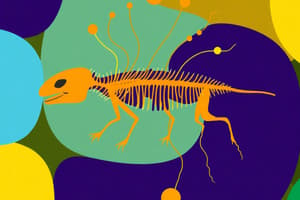Podcast
Questions and Answers
Flashcards
Law of Priority
Law of Priority
The earliest name used for a particular taxon takes precedence, even if later names are more commonly used.
No Homonymia
No Homonymia
The same scientific name cannot be used for two different taxa. Each name is unique.
Phenetics
Phenetics
A system of classifying organisms based on their visual similarities, regardless of evolutionary relationships.
Whittaker's Five Kingdoms
Whittaker's Five Kingdoms
Signup and view all the flashcards
Sibling Species
Sibling Species
Signup and view all the flashcards
Biosystematics
Biosystematics
Signup and view all the flashcards
Taxonomic Category
Taxonomic Category
Signup and view all the flashcards
Phylum Protozoa
Phylum Protozoa
Signup and view all the flashcards
Cyst Formation in Protozoa
Cyst Formation in Protozoa
Signup and view all the flashcards
Genus Eimeria
Genus Eimeria
Signup and view all the flashcards
Piroplasms
Piroplasms
Signup and view all the flashcards
Phylum Cnidaria
Phylum Cnidaria
Signup and view all the flashcards
Class Anthozoa
Class Anthozoa
Signup and view all the flashcards
Class Hydrozoa
Class Hydrozoa
Signup and view all the flashcards
Phylum Platyhelminthes
Phylum Platyhelminthes
Signup and view all the flashcards
Class Cestoda (Tapeworms)
Class Cestoda (Tapeworms)
Signup and view all the flashcards
Class Trematoda (Flukes)
Class Trematoda (Flukes)
Signup and view all the flashcards
Oncosphere
Oncosphere
Signup and view all the flashcards
Phylum Nematoda
Phylum Nematoda
Signup and view all the flashcards
Pseudocoelom
Pseudocoelom
Signup and view all the flashcards
Subclass Oligochaeta
Subclass Oligochaeta
Signup and view all the flashcards
Class Hirudinea (Leeches)
Class Hirudinea (Leeches)
Signup and view all the flashcards
Class Gastropoda
Class Gastropoda
Signup and view all the flashcards
Class Cephalopoda
Class Cephalopoda
Signup and view all the flashcards
Phylum Hemichordata
Phylum Hemichordata
Signup and view all the flashcards
Class Chondrichthyes (Cartilaginous Fish)
Class Chondrichthyes (Cartilaginous Fish)
Signup and view all the flashcards
Class Actinopterygii (Ray-finned Fish)
Class Actinopterygii (Ray-finned Fish)
Signup and view all the flashcards
Subclass Testudines (Turtles)
Subclass Testudines (Turtles)
Signup and view all the flashcards
Class Aves (Birds)
Class Aves (Birds)
Signup and view all the flashcards
Class Mammalia
Class Mammalia
Signup and view all the flashcards
Order Chiroptera (Bats)
Order Chiroptera (Bats)
Signup and view all the flashcards
Order Cetacea (Whales)
Order Cetacea (Whales)
Signup and view all the flashcards
Order Carnivora (Carnivores)
Order Carnivora (Carnivores)
Signup and view all the flashcards
Kairomons
Kairomons
Signup and view all the flashcards
Pheromones
Pheromones
Signup and view all the flashcards
Holometamorphosis
Holometamorphosis
Signup and view all the flashcards
Hemimetamorphosis
Hemimetamorphosis
Signup and view all the flashcards
Class Hexapoda (Insects)
Class Hexapoda (Insects)
Signup and view all the flashcards
Class Arachnida
Class Arachnida
Signup and view all the flashcards
Subphylum Crustacea
Subphylum Crustacea
Signup and view all the flashcards
Disruptive Selection
Disruptive Selection
Signup and view all the flashcards
Directional Selection
Directional Selection
Signup and view all the flashcards
Stabilizing Selection
Stabilizing Selection
Signup and view all the flashcards
Habitat
Habitat
Signup and view all the flashcards
Fundamental Niche
Fundamental Niche
Signup and view all the flashcards
Realised Niche
Realised Niche
Signup and view all the flashcards
Parasitism
Parasitism
Signup and view all the flashcards
Vertical Transmission
Vertical Transmission
Signup and view all the flashcards
Horizontal Transmission
Horizontal Transmission
Signup and view all the flashcards
Waterborne Transmission
Waterborne Transmission
Signup and view all the flashcards
Vector-borne Transmission
Vector-borne Transmission
Signup and view all the flashcards
Commensalism
Commensalism
Signup and view all the flashcards
Mutualism
Mutualism
Signup and view all the flashcards
Competition
Competition
Signup and view all the flashcards
Competitive Exclusion
Competitive Exclusion
Signup and view all the flashcards
Coexistence
Coexistence
Signup and view all the flashcards
Overdispersed Distribution
Overdispersed Distribution
Signup and view all the flashcards
Exponential Growth Model
Exponential Growth Model
Signup and view all the flashcards
Logistic Growth Model
Logistic Growth Model
Signup and view all the flashcards
Density-independent Factor
Density-independent Factor
Signup and view all the flashcards
r-selected Strategy
r-selected Strategy
Signup and view all the flashcards
K-selected Strategy
K-selected Strategy
Signup and view all the flashcards
Decomposers
Decomposers
Signup and view all the flashcards
Photosynthesis
Photosynthesis
Signup and view all the flashcards
Trophic Level
Trophic Level
Signup and view all the flashcards
Behavioral Ecology
Behavioral Ecology
Signup and view all the flashcards
Ritualization
Ritualization
Signup and view all the flashcards
Territorial Behavior
Territorial Behavior
Signup and view all the flashcards
Fixed-Action Pattern
Fixed-Action Pattern
Signup and view all the flashcards
Study Notes
Biosystematics
- Biosystematics is the modern science of classification
- Classification of organisms based on overall similarity
- Whittaker recommended 5 kingdoms
- Binomial system is based on 2 names (genus-species)
- Cladistics is a classification system
- Phenetics is a classification system
Taxonomy
- Taxonomy is the science of naming, defining, and classifying groups of biological organisms based on shared characteristics.
- Nomenclature is the process of naming organisms.
- Stability and priority are important.
- Homonyms should be avoided.
Prokaryotes, Protozoa, and Helminths
- Kinetoplastida group includes Diplomonadida and Trichomonadida
- Important genus of haemosporinids is Plasmodium and Babesia
- Plasmodium and Babesia develop in blood-sucking arthropod vectors
- Coccidia, like Eimeria and Toxoplasma, are important parasitic protozoa
- Coccidia without cyst formation: Eimeria, Toxoplasma, Plasmodium
- Piroplasms: Babesia
- Protozoa exhibit cyst formation in certain genera
Cnidaria
- Myxozoa are closely related to Cnidarians
- Anthozoa lack a medusa stage
- Cubozoa have an absent polyp stage
- Hydrozoa have budding of the polyp stage sometimes absent in some, while other times it is present
- Hydrozoa has both a polyp and medusa stage
Platyhelminthes
- Flatworms belong to the phylum Platyhelminthes
- Cestodes (tapeworms) have no gut
- Trematodes (flukes) have a two-branched (blind-ending) gut
Nematoda
- Nematodes are a phylum with about 200,000 described species.
- Nematodes significant from a veterinary point of view are around 20,000.
Annelida
- Lumbricus terrestris is in the subclass Oligochaeta, characterized by external fertilization
- Leeches (subclass Hirudinea) can have different types of feeding apparatus
Mollusca
- Cephalopods are considered the most intelligent invertebrate group.
- Sea-squirts (Urochordata) belong to the phylum Chordata
Chordata
- Hagfish belong to the class Myxini (craniata/Agnatha).
- Lampreys belong to class Agnatha/Cyclostomata .
- Actinopterygians (ray-finned fishes) have various body coverings (Non-cornified, horny scales, waterproofed).
Reproduction
- Number of ovaries in adult Taenia: two
- Nematode copulatory bursa: Strongylida, Adenophorea, Secernentea
Vertebrata
- The most ancient type of scales (characteristic of Chondrichthyes) are placoid scales.
Fish and Reptiles
- The approximate number of reptilian species is 6,400.
- Dermal scales are characteristic of reptile body covering
- Diapsid and anapsid skull types may be found in squamous reptiles.
Birds
- Avian species: approximately 9,700.
- Phasianus colchicus (pheasants) belongs to the order Galliformes
- Anas spp. are in the order Anseriformes
Mammals
- Mammalian species: approx. 5,000 to 7,000
- Order Chiroptera (bats) use echolocation
- Mammals have a double aortic arch
- Placental mammals have 2–22 teats, usually in two rows, in some cases in a circle.
- Order Perissodactyla: like the tapir
- Order Primates, includes species like humans
- Carnivores have carnassial teeth
Invertebrates
- Arachnids include ticks (Dermanyssus gallinae), pseudoscorpions and mites.
- Six-hooked oncosphere is the first stage larva in Cyclophyllidea and Pseudophyllidea
Arthropods
- Fleas, ticks, and lice are examples of blood-feeding arthropods
- The life cycle of fleas is egg-larva-pupa-adult
Insects
- Some insects undergo complete metamorphosis (egg-larva-pupa-adult), while others undergo incomplete metamorphosis (egg-larva-nymph-adult)
Studying That Suits You
Use AI to generate personalized quizzes and flashcards to suit your learning preferences.




